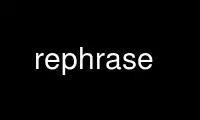
This is the command rephrase that can be run in the OnWorks free hosting provider using one of our multiple free online workstations such as Ubuntu Online, Fedora Online, Windows online emulator or MAC OS online emulator
PROGRAM:
NAME
rephrase - Specialized passphrase recovery tool for GnuPG
DESCRIPTION
rephrase is a specialized passphrase recovery tool for GnuPG. If you can nearly remember
your GnuPG passphrase - but not quite - then Rephrase may be able to help.
Tell Rephrase the parts of the passphrase you know, and any number of alternatives for the
parts you're not sure about; and Rephrase will try all the alternatives, in all possible
combinations, and tell you which combination (if any) gives you the correct passphrase.
You could try all the combinations yourself, of course, if there are just a handful of
them; but if there are more, that might be impractical.
On the other hand, if you need to try a huge number of possible passphrases, Rephrase
might be too slow; it is far from being an efficient passphrase cracker. E.g. Rephrase
can try out about 2600 possible passphrases per minute on my 1GHz Athlon (with other
processes doing nothing very heavy at the same time). How many passphrases Rephrase can
try depends on how long you are prepared to wait! Rephrase can reasonably be run for a
long time; e.g. it *won't* use more memory the longer it runs.
It would be a Bad Thing to leave your passphrase (or part of it, or your guesses at it)
lying around on your hard drive; since a passphrase is supposed to be an extra line of
defence if an attacker obtains access to your secret keyring (which you presumably *do*
keep on your hard drive). That's why Rephrase keeps all the information about your
passphrase that you give it in secure memory (and then pipes each possible passphrase to a
child gpg process). For this reason, Rephrase is likely to be more secure than
alternative solutions that involve generating a list of possible passphrases in a file and
then testing them.
[1] For more information about GnuPG, see http://www.gnupg.org/ .
USAGE
rephrase <key>
where <key> is the key whose passphrase you want to recover; you can identify the key in
any of the ways that GnuPG understands. (To make sure you're using a sensible value for
<key>, you could first try
gpg --list-secret-keys <key>
which should list exactly 1 key.)
You will be prompted to enter a pattern (the pattern is not echoed to the screen as you
type it). So what's a pattern? Suppose you know that your passphrase was something like
"super-secret", but you're not sure if you changed some (or all) of the "e"s into "3"s, or
any of the consonants into upper case, or indeed changed the "c" into "k" or "K" or even
"|<", or changed the "-" into " " or just omitted it. Then you could enter this pattern:
(s|S)u(p|P)(e|3)(r|R)(-| |)(s|S)(e|3)(c|C|k|K|\|<)(r|R)(e|3)(t|T)
The pattern is your passphrase - except that 4 characters have special meanings. Brackets
- "(" and ")" - are used to group alternatives wherever you're not sure what characters
are correct; "|" is used inside a pair of brackets to separate the alternatives; and "\"
is used to escape any of the 4 special characters when you need to use it literally.
Rephrase will tell you if your pattern contains a syntax error. That happens if there are
unbalanced brackets (i.e. they aren't in proper pairs); or if the pattern ends with "\"
(because then there's nothing for it to escape). It also happens (and these cases are
limitations in Rephrase's simple pattern parser) if you try to nest pairs of brackets; or
if you try to use "|" anywhere that's not inside a pair of brackets.
If the pattern contains no syntax errors, Rephrase will try each possible passphrase
matching the pattern in turn. If the correct passphrase is found, Rephrase won't actually
tell you what it is (in case someone's looking over your shoulder), but will tell you a
string of numbers: you can work out the correct passphrase from these numbers and the
pattern you entered. E.g.
2 1 2 1 2 1 1 5 1 2 2
The first number - 2 - means that at the first pair of brackets in the pattern - "(s|S)" -
you must take the second alternative - viz. "S". The second number - 1 - means that at
the seconds pair of brackets - "(p|P)" - you must take the first alternative - viz. "p".
And so forth. So in this case the correct passphrase is "Sup3r se|<r3T".
If the correct passphrase is not found from the pattern, Rephrase tells you so. (Note
that you will also get this result if you specified <key> incorretly; how to check that
the value of <key> is OK is explained above.)
Rephrase's exit status is 0 is the passphrase is found, 1 if it's not found, or other
values if an error occurs.
SECURITY
The good news is that Rephrase uses mlock() in order to keep the information about
passphrases that it's given as secure as possible. The bad news is that using mlock()
requires root privileges, so Rephrase needs to be setuid root. However, it does drop root
privileges very quickly, as soon as it has called mlock().
It's also debatable whether mlock() is a proper way to protect sensitive information.
According to POSIX, mlock()ing a page guarantees that it *is* in memory (useful for
realtime applications), not that it *isn't* in the swap (useful for security
applications). Possibly an encrypted swap partition (or no swap partition) is a better
solution. Anyway, GnuPG itself uses mlock(), which makes it sensible for Rephrase to
follow suit.
Use rephrase online using onworks.net services
